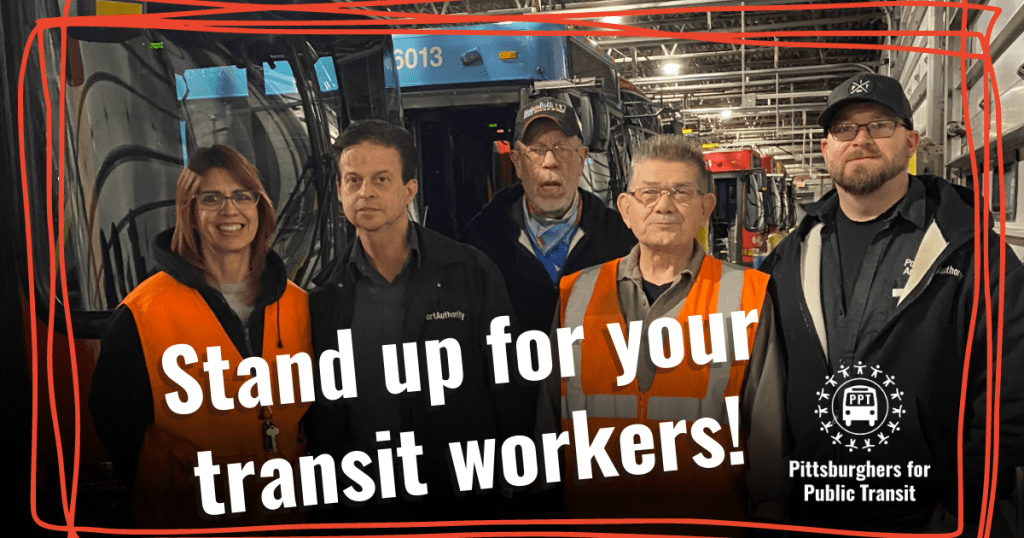
Without transit workers, we have no transit system. Our transit system is short 220+ workers and our scheduled service is in decline. This Transit Worker Appreciation Day, join PPT in calling on our next Allegheny County Executive to build better public transit by addressing the worker crisis.
On Saturday, March 18th, we celebrate National Transit Worker Appreciation Day. While we at Pittsburghers for Public Transit love and support our Pittsburgh Regional Transit (PRT) operators and maintenance workers every day, we know that the workforce is right now in crisis, and want to take this opportunity to lift up worker voices and ensure that politicians are hearing their demands.
Support the demands that transit workers are making and send a tweet to tell County Executive candidates to build better public transit by addressing the worker crisis.
PRT needs to take care of the workers they have and hire more
Without transit workers, we have no transit system. Right now, Pittsburgh Regional Transit (PRT) is short more than 220 transit operators, and 40-60 maintenance workers. That’s why riders have been seeing service cuts every few months, with no end in sight; we’ve already lost 10% of the total scheduled service that we had before the pandemic, and with the wave of retirements coming this year and next, these cuts will be irreversible. At this point, PRT cannot even train workers quickly enough to replace the number of workers leaving each month. We need PRT to make a plan and make it fast, becasue this downward trend is only getting worse without one.
President and Business Agent Ross Nicotero of the Amalgamated Transit Union (ATU) Local 85 just published an excellent opinion piece in the Pittsburgh Tribune Review laying out the worker hiring and retention crisis and how our County Executive and PRT can take action to fix it.
Several weeks ago, Pittsburgh Regional Transit (PRT) launched a public input process to overhaul the downtown bus network. This is the first portion of a system-wide transit network redesign, to ostensibly make our bus routes faster, more understandable and more effective in serving our riders’ needs. As transit workers, we’re certainly supportive of adjusting our routes to keep buses from getting stuck for ages in car traffic and to ensure that riders can reliably and quickly get to their destinations.
But it is difficult to talk about how PRT’s bus network redesign will improve the rider experience without talking about the catastrophic service cuts we’re simultaneously experiencing due to ongoing worker shortfalls and PRT’s implementation of its vaccine mandate. At this moment, the network redesign feels a bit like rearranging the deck chairs on the Titanic.
[…]
We are losing workers to jobs that offer more flexibility and higher pay. At the same time, the job has become more difficult. Operator assaults have increased, rigid scheduling requirements make it difficult for junior operators with child or elder care responsibilities, and a lack of access to restrooms on route and break rooms at depots exacts a health toll.
Here are five key ways that PRT can address these challenges head on:
• Rehire the 80-plus experienced employees that were terminated due to the vaccine mandate. These skilled workers can promptly address more than a third of the employee shortfall gap, and policies like mask mandates and regular covid testing for unvaccinated workers can address safety concerns.
• Narrow or close the wage progression/salary scale. New front-line workers begin at a $15-$18/hour training wage, and need to work for four years before reaching operator and maintenance worker regular rates.
• Incentivize good attendance with bonuses and reward employees for their courageous service through the pandemic with hazard pay. Bus operators and maintenance workers worked tirelessly throughout the pandemic. They should be compensated accordingly so we can retain our dedicated workforce.
• Work with local universities, high school and labor to expand training and apprenticeship. This can improve job pipelines and get students interested in and prepared to work for PRT.
• Ensure bathrooms with proper route scheduling are available to ensure the dignity of bus operators. Pandemic-related business closures and longer work days created new challenges to ensuring that bathrooms are available to bus operators. Resources need to be deployed to ensure they have adequate time and appropriate break facilities during their runs.
We know that PRT clearly understands that higher starting wages helps with worker recruitment, because the agency just negotiated a whopping 18% raise increase for transit police, citing a need to “get our police officers to a level in which we can attract and retain them.”
PRT needs to fix the schedules to benefit transit workers and riders
We also know that poor route scheduling by management at PRT has created huge problems for riders and transit workers alike. This past month, we published a report entitled Representing our Routes, looking at the impacts of poor scheduling on on-time performance for routes that run through the City of Pittsburgh; of the 105 routes in the whole PRT system, 38 routes experienced service reliability of 50% or less for a month or more in 2022. Unreliable and unrealistic scheduling of routes has been catastrophic for riders, resulting in missed appointments, lost jobs, and impacts to rider access to schools and childcare.
But poor route scheduling also affects transit operators, who are unfairly targeted by riders frustrated by the late or ghost buses, and PRT operators often feel pressured into skipping lunch and bathroom breaks because their buses are chronically 20 minutes or more behind schedule. This has led to extremely low morale among workers, and high attrition rates.
One transit operator said that he was planning to return to ICU nursing, a career he had left several years ago, because he believed that the hospital was less stressful than driving a bus.
Support the demands that transit workers are making and send a tweet to tell County Executive candidates to build better public transit by addressing the worker crisis.